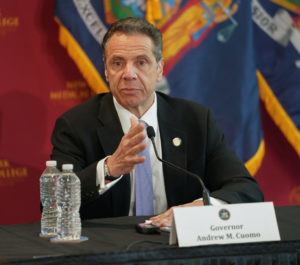
Governor Andrew M. Cuomo delivers briefing on Coronavirus pandemic. Image Credit: Governor’s Office
Advocates and industry leaders calling for more protections and more action from Governor. On May 7, 2020, New York Governor Andrew Cuomo issued Executive Order No. 202.28, extending the eviction moratorium through August 20, 2020. The moratorium prevents the filing of eviction proceedings against both residential and commercial tenants. The original eviction moratorium, came by way of Chief Administrative Judge Lawrence K. Marks on March 15, 2020, and was reinforced by Governor Cuomo’s Executive Order No. 202.8, on March 20, 2020. The March 20 order extended the eviction moratorium through June 20, 2020. Read CityLand’s initial coverage of the eviction moratorium here.
In addition to the eviction moratorium extension, Executive Order 202.28 has two other key provisions pertaining to renters. First, landlords will not be entitled to late fees during the duration of the moratorium. Second, the order will permit renters facing hardship, to enter into a written agreement to use their security deposit to pay rent that is in arrears or will become due. Security deposits used to pay rent would then need to be repaid within 90 days. If the deposit is less than a full month’s rent, the tenant would still be responsible for the remaining owed rent. The order makes clear that it is solely the tenant’s option to enter into such an agreement, and the landlord may not threaten or coerce the tenant into that agreement.
In a press release, Governor Cuomo said, “During these incredibly difficult and stressful times we must protect New Yorkers who are facing financial hardships due to COVID-19,” adding, “The majority of people in the state live paycheck to paycheck, and all of a sudden the paychecks have stopped for these individuals but the rent bills keep coming in.” Extending the moratorium until August 20th, Cuomo purports will “provide some relief to those New Yorkers who are struggling.”
Sherwin Belkin, founding partner with the law firm Belkin Burden & Goldman LLP stated, “New Yorkers all recognize the havoc that the COVID-19 pandemic has played with all of our lives. I certainly understand Governor Cuomo’s desire to aid those tenants that are suffering economic hardship due to the pandemic. But, the Executive Order provides no detail as to how COVID-hardship shall be determined. Certainly, tenants that are able to pay their rent should do so.”
Belkin continued, “the Executive Order bars proceedings or evictions based upon non-payment of rent until August 20th for COVID-hardship tenants. But, tenants are not the only one’s suffering significant hardship. Real estate taxes, water, sewer, mortgage payments, building maintenance, staff, etc., the expenses all continue. Now, owners are asked to forgo the ability to collect rent from certain tenants. Although the Governor stated that relief will be provided to owners to offset the economic injury they will suffer, as yet no relief has been forthcoming,” adding, “the effective closing of the courts to new proceedings is leaving many property owners in state of legal limbo, where they have rights but no remedies. And, the longer courts remain shuttered, the more likely that the courts will be flooded once the doors are opened again. It is imperative that there be balance to the governmental relief provided and that the courts be re-opened swiftly to avoid exacerbating an already difficult situation.”
In a press release, Adriene Holder, Attorney-in-Charge of The Legal Aid Society’s Civil Practice, commended the Governor for extending the moratorium period but called for a “stronger approach.” Holder stated “We must expand voucher programs for people experiencing homelessness, enact Good Cause legislation to help protect New Yorkers in ‘market rate’ housing from eviction, rent arrears protection for tenants, and safe harbor legislation,” adding, “this is not the time for half-measure and policy that leave out the most vulnerable New Yorkers.”
REBNY President James Whelan said, “City residents and small retailers directly impacted by the COVID-19 pandemic will need more time to pay their bills and more help from the federal government to do so. Those fortunate enough to have escaped the impact of this unprecedented public health and economic crisis do not need these protections though. If you are staying in the Hamptons instead of your Manhattan apartment, or are a credit worth commercial tenant, you should not get away with not paying rent.”
For New York City-specific COVID-19 updates, the City has established an information site with updates from all major administrative agencies. Agencies include the Department of Buildings, City Planning, Citywide Administrative Services, the Department of Finance and the Department of Transportation among others. You can find that page here.
By: Jason Rogovich (Jason Rogovich is the CityLaw Fellow and New York Law School Graduate, Class of 2019)

